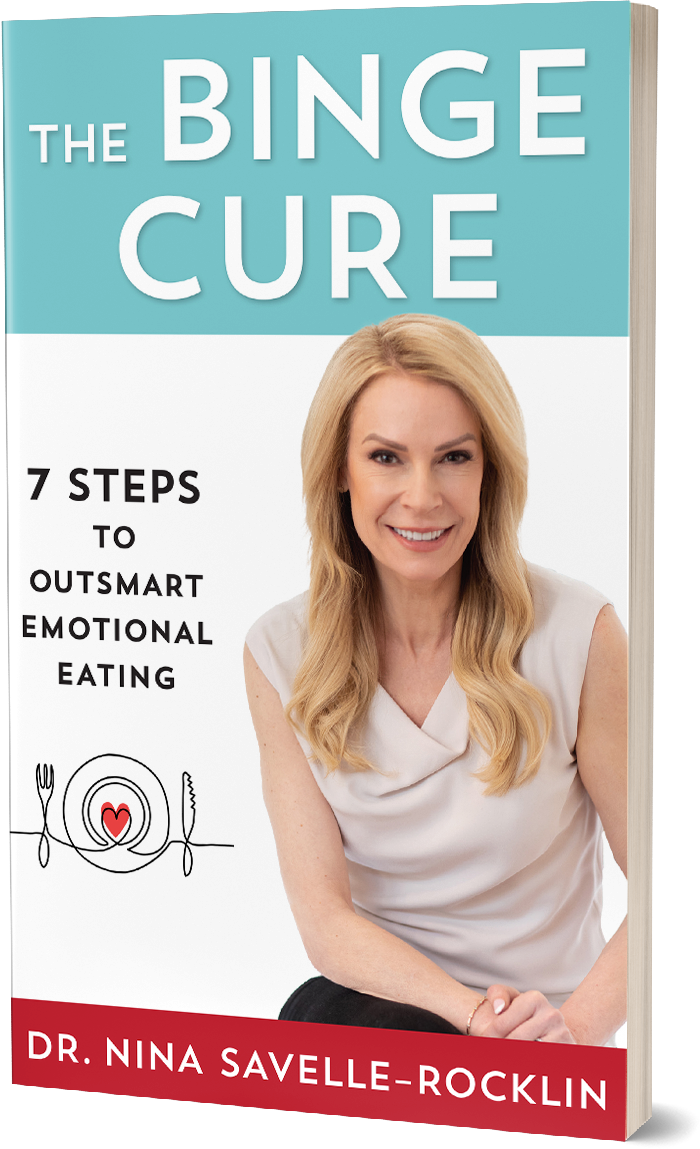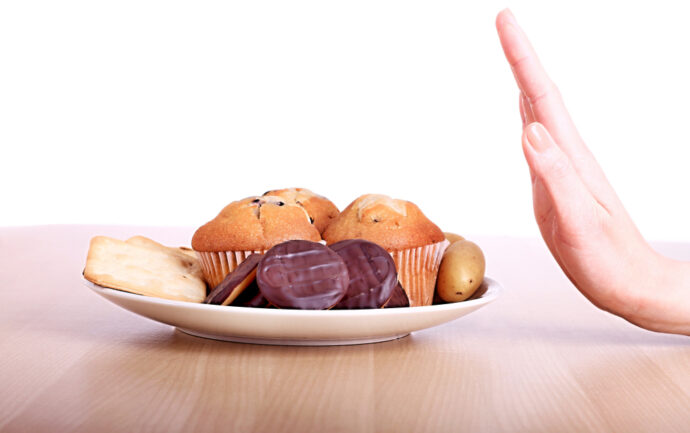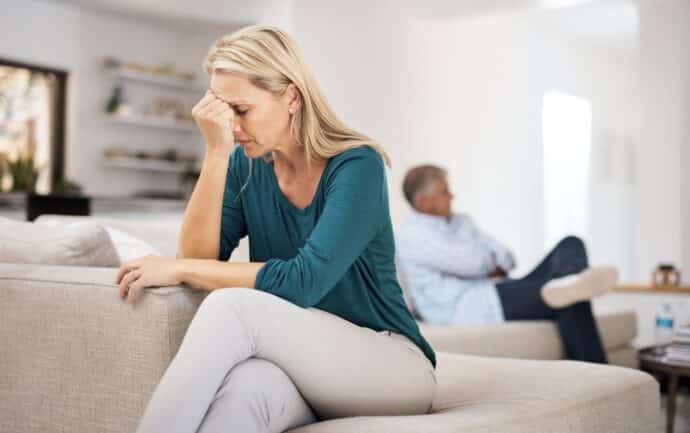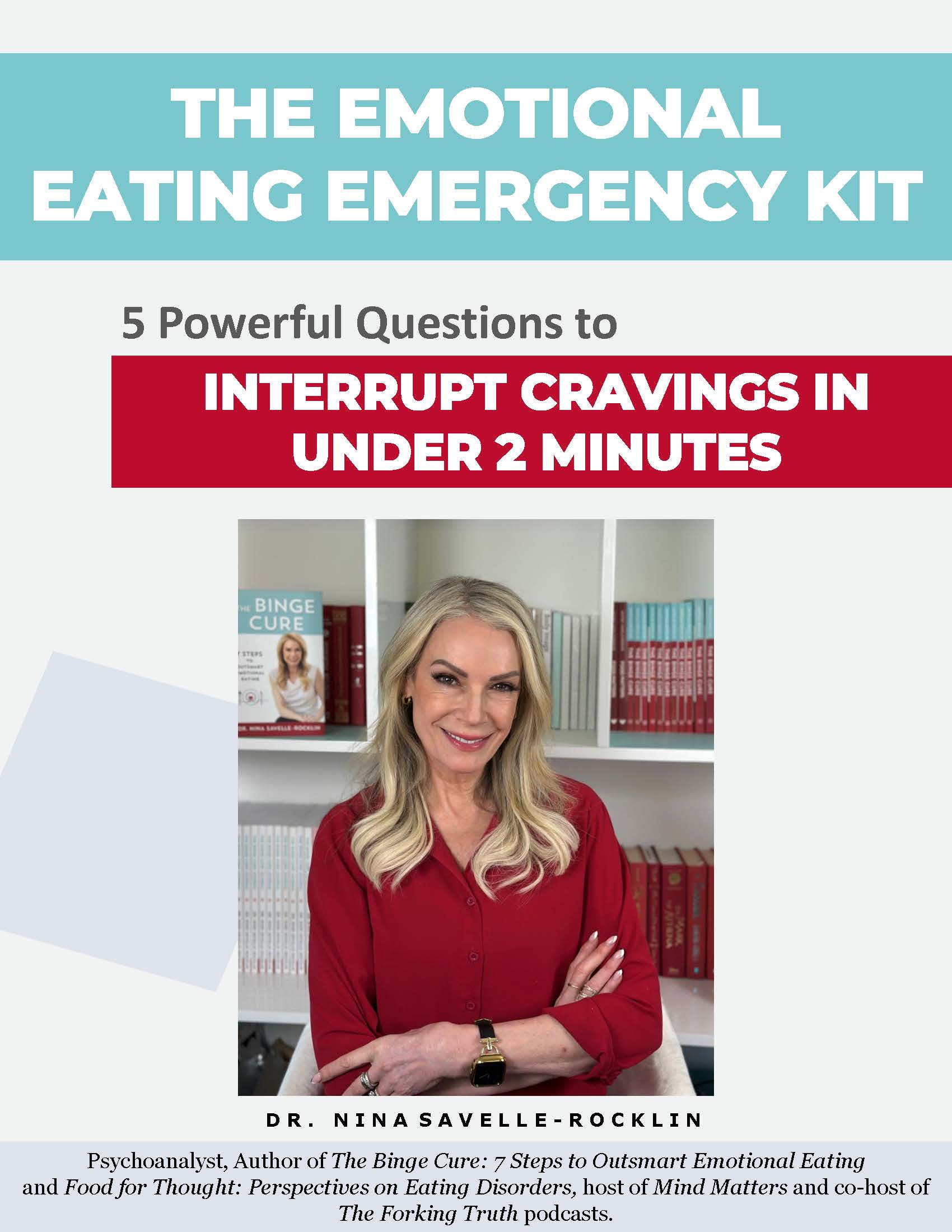Dr. Nina Savelle-Rocklin
Why Do I Binge Eat? Here are 3 Reasons Why
Table of Contents
- Let’s talk about the “F” word
- 3 reasons you may be bingeing
- What should you do?
- Frequently Asked Questions
We all have our own idea of what binge eating is. Many of us blame food when we’re out of control with food.
This is usually how the train of thought goes:
“If I was using alcohol or cigarettes to cope I could just quit cold-turkey. But I can’t quit eating food because I need food to live. I'll be stuck bingeing forever.”
But the truth is food does not cause you to binge.
In fact, food is a solution to the problem, it is not the problem.
In this blog, I'll tell you what actually causes you to binge and how to create change.
Let’s talk about the “F” word
The reason for bingeing is predominantly psychological. And, it starts with the “F” word.
No, not that F word. The other “F” word:
“Feelings”

Our culture tells us that feelings are to be avoided. We’re considered weak if we feel them and strong if we can push them away. Our feelings include:
- Anger
- Sadness
- Anxiety
- Loneliness
- Guilt
- Shame
- Vulnerability/Helplessness
Since there are so many societal and family prohibitions against experiencing emotions, many of us don’t learn how to respond to ourselves when we feel uncomfortable or upset. We want to avoid or suppress them. And, one way to do this is by eating.
Why is that? Food is often associated with comfort, love, and safety. So, turning to food is easier than processing our feelings. Essentially, you binge as a way of coping with emotions. But, this is a coping strategy that ultimately hurts more than it helps.
3 reasons you may be bingeing
1. Eating more because of restriction
Do you know why you shop more during the sale season? Because you don't want to lose out on great deals. Similarly, when you forbid yourself from eating pizza, ice cream cookies, or any of your favorite food, you want it more. The next time you allow a cheat day, you eat more than you normally do. The anticipation or experience of deprivation just makes you want it even more. This is why diets fail.
2. Turning emotional pain to physical pain
We often use food to turn our suppressed emotions into physical pain. For example, bingeing so much that you’re in physical pain is a way of converting emotional pain into physical pain. After all, it’s easier to take care of physical pain than it is to address emotional wounds.
3. Eating as a distraction
We are conditioned to avoid our feelings rather than deal with them. So when you experience something uncomfortable or unpleasant, you might turn to food to distract yourself, numb yourself, or focus on what you just ate instead of attending to what’s eating “at” you.
As you can see, when it comes to binge eating, food is not the problem. Food is not a trigger causing you to binge. Bingeing is a way of avoiding your emotions.
Changing the way you eat will not help you stop binge eating. No matter what you eat, or if you eat in regular intervals, focusing on food will not help you get to the roots of binge eating and cure it forever!
You have to get to the root of why you’re turning to food instead of focusing on what you're eating. And, the only way to get rid of bingeing is to actually feel your feelings. The more you feel, the more you heal.
What should you do?
Now that you know that the real reason behind your bingeing is a way of avoiding feelings, it's time to make some changes.
- Do self-introspection. Find out what you feel. Watch the foods you binge. Read my free Food-Mood formula guide to recognize your feelings.
- Ask yourself what experiences cause you to feel this way. Find the real problem.
- Accept your feelings and take healthy steps to respond to them, such as positive self-talk and treating yourself as a friend.
If you’re ready to start your journey to freedom from a toxic relationship with food, read my step-by-step guide ‘The Binge Cure: 7 Steps to Outsmart Emotional Eating.
Binge Eating Disorder is treatable. But change doesn’t happen through willpower, diets, or control. Only by making peace with yourself and finding new ways to respond to your thoughts and emotions can you make peace with food.
Listen to me talk about why we binge eat here.
Comment below and join me in my Facebook community to meet others on the same journey to creating a life of food freedom, liberation and self-love.
Frequently Asked Questions
Why do I always binge eat at night?
There are possibly two reasons. One is that you don't eat enough during the day. If you skip meals and avoid eating food during the day, you'd naturally be hungry at night.
The other is psychological, which I feel is the primary reason. During the day, you're busy and occupied with many things that you don't have time to think about your life. Then, at night, when you're done with your errands, you enter into a state of BEING and start thinking about things that bother and upset you. So, instead of dealing with it, you turn to food.
If avoiding certain foods is a problem, what should I do?
If you think you can't have pizza, ice cream, or chocolate (as an example) you're just going to crave it more. So challenge yourself and the rule. When you truly give yourself permission to eat those forbidden foods, you can decide
1) if you really want it and
2) how much you're going to have.
Trust me, it feels empowering!
What are some other ways that I can use to distract myself?
Instead of turning to food, try some healthier activities that help you relax and rejoice. For example, painting, sketching, watching a feel-good movie, reading, crosswords, solving sudoku, etc. Pick up a hobby and ignite your creativity. Or, listen to my podcast with Dr. Bob Rich on how to turn your triggers into laughter.

Sick of obsessing about every bite?
GET THE CURE
The Binge Cure Book!
Enter “CURE” to receive a 20% discount.
I’d love to conquer binge eating by ordering Dr. Nina’s book, The Binge Cure!
No, I don’t want access to this terrific resource to help me overcome binge eating.
The Author

Dr. Nina Savelle-Rocklin is a renowned author and podcast host and one of the nation’s leading psychoanalysts known for the psychology of eating. Her signature message of, “It’s not what you’re eating, it’s what’s eating ‘at’ you” has resonated with hundreds of thousands of listeners from around the globe in 40 countries. As founder of The Binge Cure Method, she guides emotional eaters to create lasting food freedom so they can take back control of their lives and feel good in their bodies.
Related Blogs




















